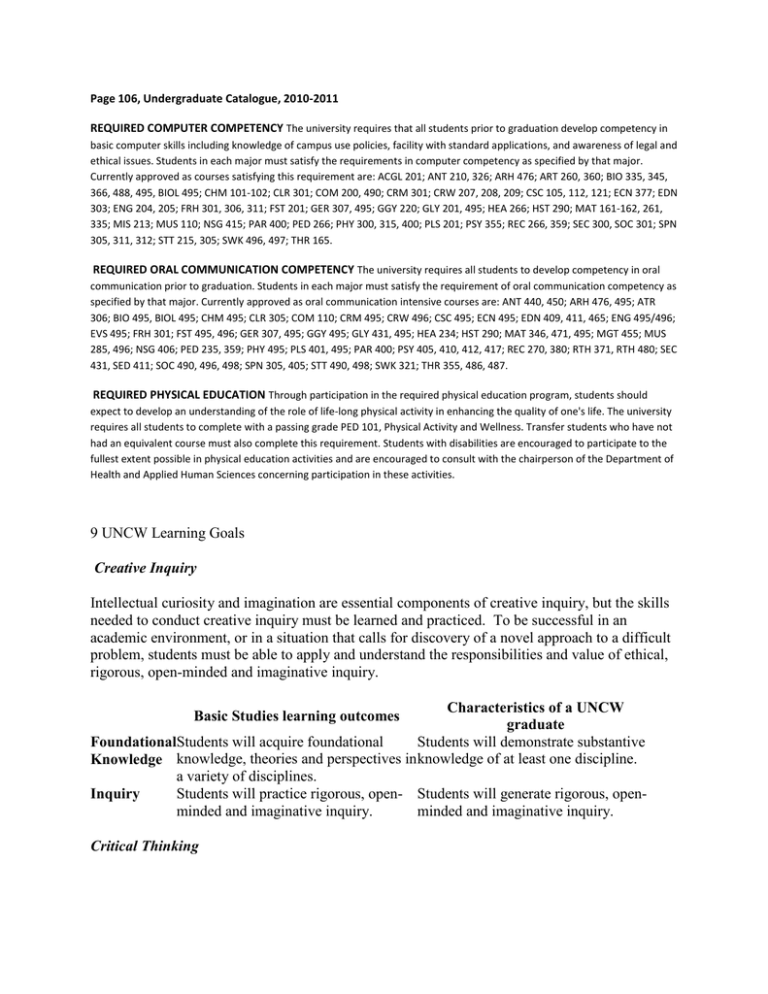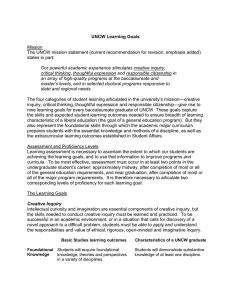Page 106, Undergraduate Catalogue, 2010-2011 REQUIRED COMPUTER COMPETENCY
advertisement

Page 106, Undergraduate Catalogue, 2010-2011 REQUIRED COMPUTER COMPETENCY The university requires that all students prior to graduation develop competency in basic computer skills including knowledge of campus use policies, facility with standard applications, and awareness of legal and ethical issues. Students in each major must satisfy the requirements in computer competency as specified by that major. Currently approved as courses satisfying this requirement are: ACGL 201; ANT 210, 326; ARH 476; ART 260, 360; BIO 335, 345, 366, 488, 495, BIOL 495; CHM 101-102; CLR 301; COM 200, 490; CRM 301; CRW 207, 208, 209; CSC 105, 112, 121; ECN 377; EDN 303; ENG 204, 205; FRH 301, 306, 311; FST 201; GER 307, 495; GGY 220; GLY 201, 495; HEA 266; HST 290; MAT 161-162, 261, 335; MIS 213; MUS 110; NSG 415; PAR 400; PED 266; PHY 300, 315, 400; PLS 201; PSY 355; REC 266, 359; SEC 300, SOC 301; SPN 305, 311, 312; STT 215, 305; SWK 496, 497; THR 165. REQUIRED ORAL COMMUNICATION COMPETENCY The university requires all students to develop competency in oral communication prior to graduation. Students in each major must satisfy the requirement of oral communication competency as specified by that major. Currently approved as oral communication intensive courses are: ANT 440, 450; ARH 476, 495; ATR 306; BIO 495, BIOL 495; CHM 495; CLR 305; COM 110; CRM 495; CRW 496; CSC 495; ECN 495; EDN 409, 411, 465; ENG 495/496; EVS 495; FRH 301; FST 495, 496; GER 307, 495; GGY 495; GLY 431, 495; HEA 234; HST 290; MAT 346, 471, 495; MGT 455; MUS 285, 496; NSG 406; PED 235, 359; PHY 495; PLS 401, 495; PAR 400; PSY 405, 410, 412, 417; REC 270, 380; RTH 371, RTH 480; SEC 431, SED 411; SOC 490, 496, 498; SPN 305, 405; STT 490, 498; SWK 321; THR 355, 486, 487. REQUIRED PHYSICAL EDUCATION Through participation in the required physical education program, students should expect to develop an understanding of the role of life-long physical activity in enhancing the quality of one's life. The university requires all students to complete with a passing grade PED 101, Physical Activity and Wellness. Transfer students who have not had an equivalent course must also complete this requirement. Students with disabilities are encouraged to participate to the fullest extent possible in physical education activities and are encouraged to consult with the chairperson of the Department of Health and Applied Human Sciences concerning participation in these activities. 9 UNCW Learning Goals Creative Inquiry Intellectual curiosity and imagination are essential components of creative inquiry, but the skills needed to conduct creative inquiry must be learned and practiced. To be successful in an academic environment, or in a situation that calls for discovery of a novel approach to a difficult problem, students must be able to apply and understand the responsibilities and value of ethical, rigorous, open-minded and imaginative inquiry. Characteristics of a UNCW graduate Students will demonstrate substantive FoundationalStudents will acquire foundational Knowledge knowledge, theories and perspectives in knowledge of at least one discipline. a variety of disciplines. Students will practice rigorous, open- Students will generate rigorous, openInquiry minded and imaginative inquiry. minded and imaginative inquiry. Basic Studies learning outcomes Critical Thinking An educated person must be able to interpret and evaluate information, and distinguish between the reliable and the unreliable. Acquiring information literacy and learning how to be a critical thinker requires practice in locating, evaluating, interpreting, and using information effectively from multiple sources, and by applying both academic and technological skills. Students must gain experience in critical evaluation of complex problems and in the formulation of solutions using creative, quantitative, qualitative, and/or scientific perspectives. Characteristics of a UNCW graduate Students will interpret and evaluate Information Students will locate and effectively apply information using academic and information using academic and Literacy technological skills. technological skills. Students will use multiple methods and Students will integrate multiple Critical methods and perspectives to critically Thinking perspectives to critically examine complex problems. examine complex problems. Basic Studies learning outcomes Thoughtful Expression The ability to formulate and clearly communicate ideas is an advantage in every aspect of life. With the goals of a liberal education in mind, students must acquire the ability to express themselves effectively in speech and in writing in relation to the broader questions of knowledge and value raised in the arts, sciences and humanities. The ability to understand global issues and interact with others in a global society demands a basic proficiency in speaking, listening, writing and reading in a language in addition to English. Characteristics of a UNCW graduate Thoughtful Students will demonstrate an ability to Students will demonstrate effective Expression express meaningful ideas in writing. oral communication and produce effective written communication. Students will demonstrate basic Students will demonstrate basic Second proficiency in speaking, listening, Language proficiency in speaking, listening, writing, and reading in a language in writing, and reading in a language in addition to English addition to English Basic Studies learning outcomes Responsible Citizenship Producing an increasingly educated and engaged citizenry is perhaps the most important outcome of higher education in a democracy. A responsible citizen of the 21st century understands and values the importance and implications of human diversity. Students must recognize the lifelong intellectual and ethical responsibilities of active global citizenship in an increasingly interdependent world. Productive and collaborative teamwork is essential for achieving success in the family, in the community, in society and in the workplace. Basic Studies learning outcomes Characteristics of a UNCW graduate Students will describe the importance and implications of human diversity. Students will describe the intellectual Global Citizenship and ethical responsibilities of active global citizenship. Teamwork Not expected at this level. Diversity Students will examine the importance and implications of human diversity. Students will demonstrate the intellectual and ethical responsibilities of active global citizenship. Students will demonstrate the ability to work in teams. Definitions of Terms Used in UNCW Learning Goals Foundational knowledge comprises the facts, theories, principles, methods, skills, terminology and modes of reasoning that are essential to more advanced or independent learning in an academic discipline. Inquiry is the systematic and analytic investigation of an issue or problem with the goal of discovery. Inquiry involves the clear statement of the problem, issue or question to be investigated; examination of relevant existing knowledge; design of an investigation process; analysis of the complexities of the problem, clear rationale supporting conclusions; and identification of limitations of the analysis. Information literacy is the ability “to recognize when information is needed and to locate, evaluate and use effectively the needed information.” [American Library Association. (1989) American Library Association Presidential Committee on Information Literacy. Final Report. Chicago.] Demonstrating information literacy involves determining the extent of information needed, accessing the needed information, critically evaluating the information, organizing the information to accomplish a specific purpose, and using the information ethically and legally. Critical thinking is "skilled, active interpretation and evaluation of observations, communications, information and argumentation." [Fisher and Scriven. (1997) Critical Thinking: Its Definition and Assessment, Center for Research in Critical Thinking (UK)/Edgepress (US).] Critical thinking involves a clear explanation of relevant issues, skillful investigation of evidence, purposeful judgments about the influence of context or assumptions, reasoned creation of one’s own perspective, and synthesis of evidence and implications from which conclusions are drawn. Thoughtful expression is the ability to communicate, orally and in writing, meaningful ideas in an organized, reasoned and convincing manner. Thoughtful expression involves a purpose responsive to an identified audience, effective organization, insightful reasoning and supporting detail, style appropriate to the relevant discipline, purposeful use of sources and evidence, and error-free syntax and mechanics. Second language shall be used to describe basic proficiency in speaking, listening, writing and reading in a language other than English that is sufficient for interaction and comprehension. This includes American Sign Language, but not computer languages. Diversity constitutes the knowledge, skills and attitudes necessary to examine the importance and implications of cultural and ethnic human differences. Diversity examines the significance of historical, political, social, racial, ethnic and cultural realities through critical thinking to understand and explain their implications in human endeavors. Global citizenship is characterized by the ability to evaluate large-scale impacts of historical, scientific, economic, political cultural and artistic perspectives on individuals, societies and our environment; and by participation in efforts to make the world a better place. Teamwork comprises an individual’s understanding and ability to work cooperatively toward a common goal. Characteristics that demonstrate effective teamwork include regular contribution of useful ideas, active listening and constructive use of others’ ideas, timely completion of assigned tasks, respectful interaction, and supportive conflict resolution.


